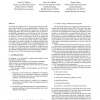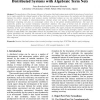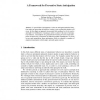33 search results - page 2 / 7 » A Learning-Based Approach to Reactive Security |
140
Voted
AGENTS
1999
Springer
15 years 6 months ago
1999
Springer
We consider the problem of how to design large decentralized multiagent systems (MAS’s) in an automated fashion, with little or no hand-tuning. Our approach has each agent run a...
143
Voted
IAJIT
2010
15 years 1 months ago
2010
: The specification of the dynamic behaviour of reactive distributed systems must exhibit the structures of control and has to imply explicitly the relevant aspects of the distribu...
145
Voted
CRYPTO
2010
Springer
15 years 3 months ago
2010
Springer
Multiparty computation protocols have been known for more than twenty years now, but due to their lack of efficiency their use is still limited in real-world applications: the goal...
94
Voted
ICDCSW
2007
IEEE
15 years 9 months ago
2007
IEEE
Today a common goal in the area of email security is to provide protection from a wide variety of threats by being more predictive instead of reactive and to identify legitimate m...
106
click to vote
AGENTS
1997
Springer
15 years 6 months ago
1997
Springer
Abstract. A special kind of anticipation is when an anticipated undesired situation makes an agent adapt its behavior in order to prevent that this situation will occur. In this ch...



